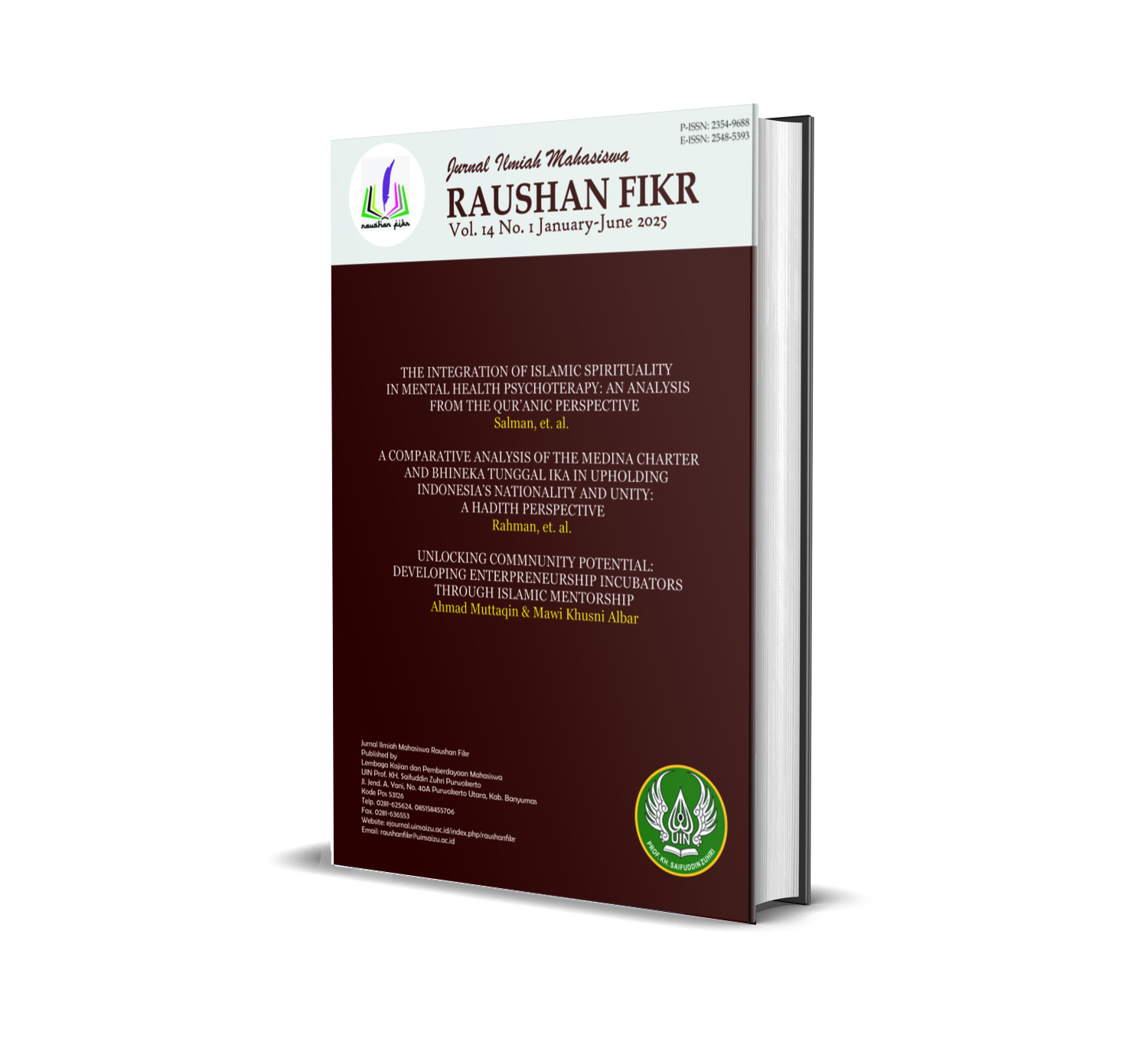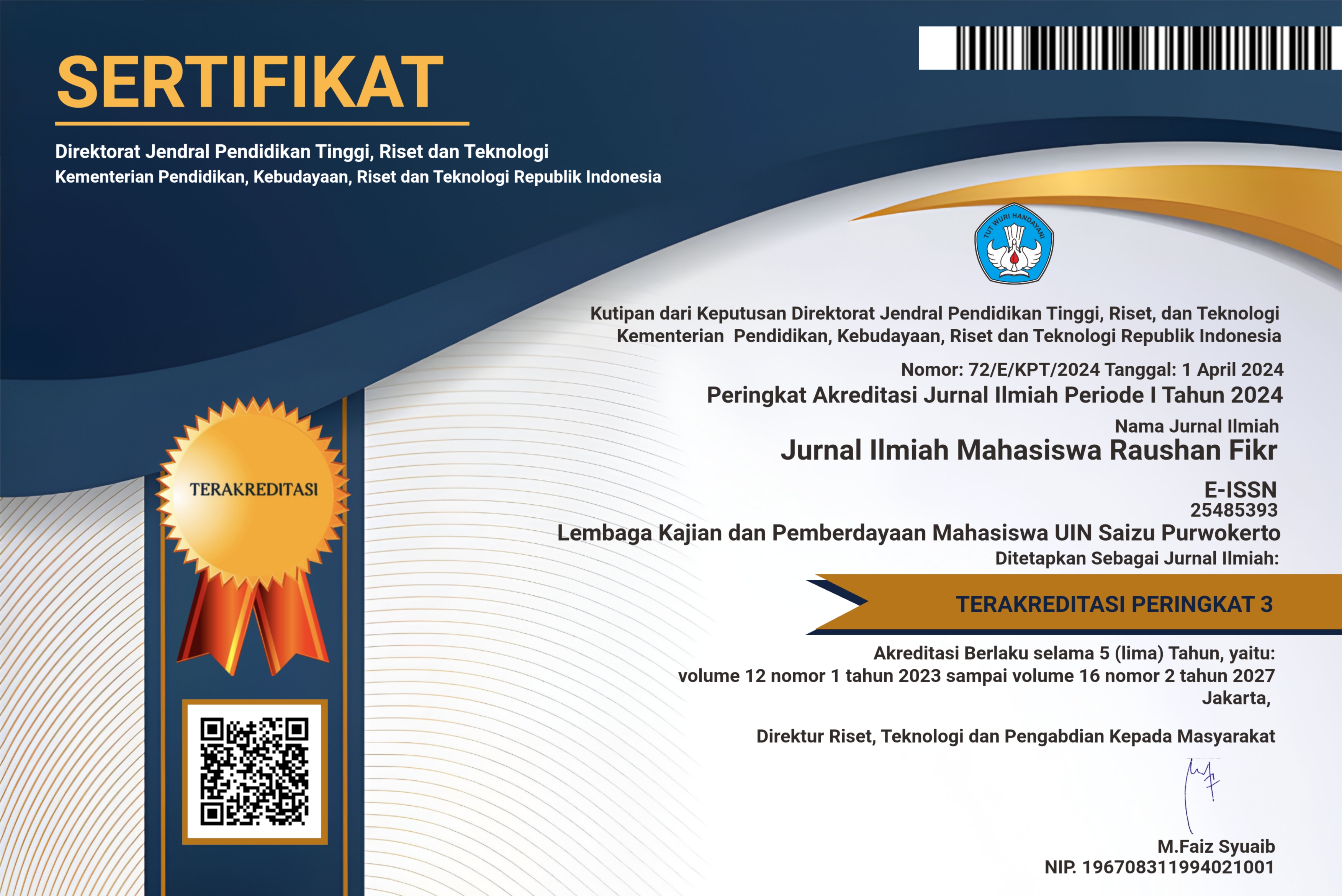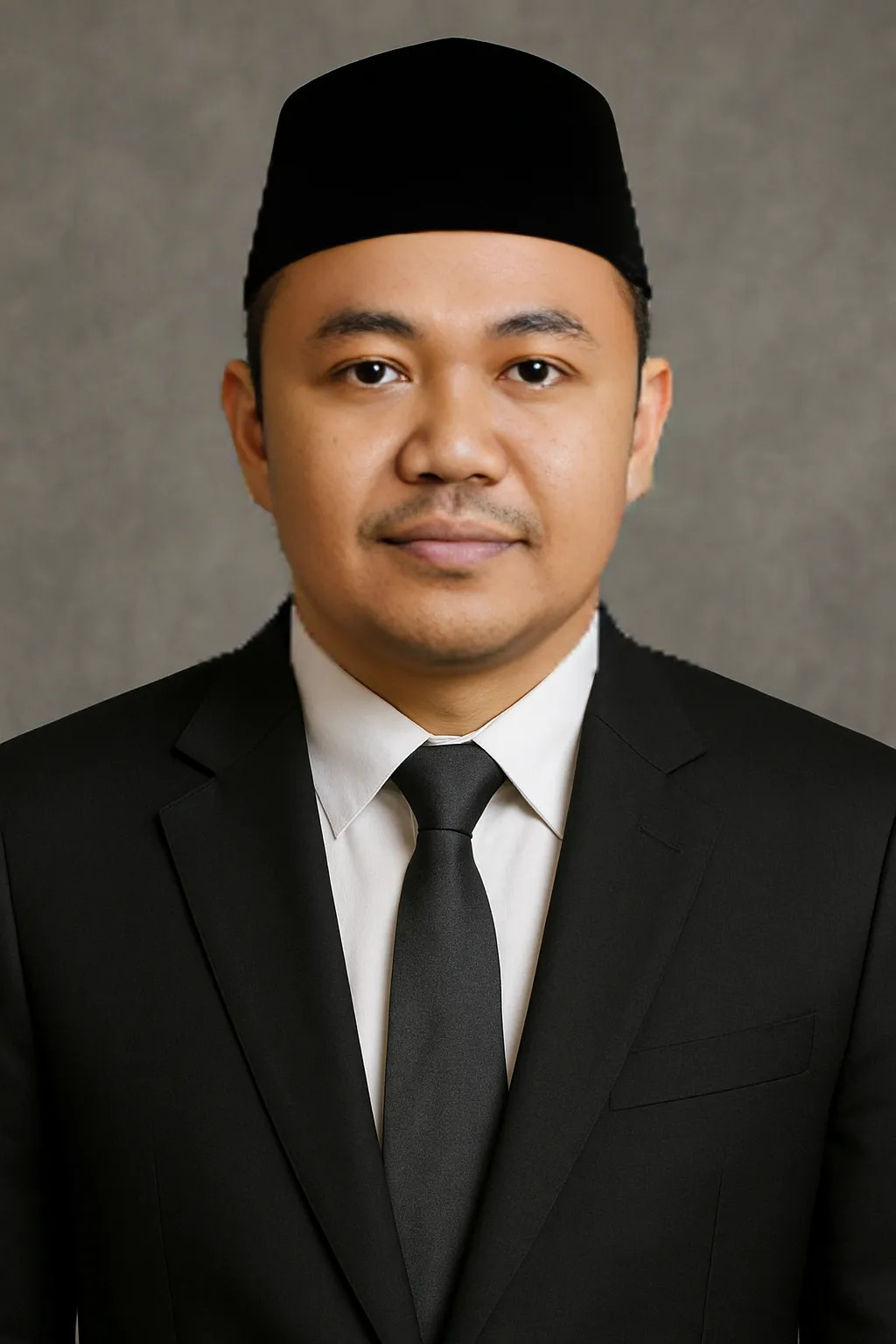Roots of Islamic Pedagogy: Insights from Haqqul Islam by Syekh Hasan Dimejo
DOI:
https://doi.org/10.24090/jimrf.v14i1.13370Keywords:
Islamic Education, Kiai Hasan Dimejo, Haqqul IslamAbstract
This study reveals that Sheikh Hasan Dimejo, through his manuscript Haqqul Islam, articulates a comprehensive framework of Islamic educational values structured into three interrelated domains. First, the faith-based values emphasize obedience to divine commandments and avoidance of prohibitions, fostering taslim — complete submission — to strengthen faith. This includes vigilance against actions that contradict Islamic principles and awareness of Satan’s deceptions. Second, the worship-related values underscore the precedence of obligatory duties over supererogatory acts. Sheikh Hasan promotes learning from scholars with deep mastery of Islamic jurisprudence, encourages the performance of righteous deeds that benefit society, and highlights the importance of seeking a lawful and beneficial livelihood. Third, the moral values stress the ethical dimension of Islamic education, such as promoting social solidarity, refraining from injustice, and upholding mutual respect in interpersonal relations. Altogether, these values reflect a holistic vision of Islamic education that integrates belief, worship, and character development, aiming to shape individuals who are spiritually grounded, socially responsible, and morally upright.Downloads
References
Anas. (2023). Aktualisasi Dakwah Agama Islam Rifa’iyah . Al-Miskawaih, 4(2). https://doi.org/10.58410/.V4I2.677
Ansor, M., Yamaguchi, M., Rizky, A., & Umar, M. (2016). Al-Ṭarīqah wa al-ḥarakah al-iḥtijājīyah al-ijtimā‘īyah bi Jawa fī al-qarn al-tāsi‘ ‘ashar: Al-Shaykh Aḥmad al-Rifā‘ī Kalisalak Namūdhajan. Studia Islamika, 23(3), 517–560. https://doi.org/10.15408/SDI.V23I3.3716
Aryani, I. K., & Yuliarti, Y. (2023). 21st Century Learning Values, Character and Moral Education in An Effort to Overcome Student’s Moral Decadence. Proceedings Series on Social Sciences & Humanities, 8, 72–84. https://doi.org/10.30595/PSSH.V8I.609
Beyers, J. (2021). The role of religion and spirituality in transforming society. Acta Theologica, 41, 52–69. https://doi.org/10.18820/23099089/ACTAT.SUP32.5
Dan Nur Aisyah, R., Pendidikan Akhlak Pemikiran Ibnu Miskawaih Dalam Kitab Tahdzib Al-Akhlak, K., & Nur Aisyah, dan. (2022). Konsep Pendidikan Akhlak Pemikiran Ibnu Miskawaih Dalam Kitab Tahdzib Al-Akhlak. Jurnal Ilmiah Bashrah , 2(1), 68–85. https://doi.org/10.58410/BASHRAH.V2I1.445
Dienlin, T., & Johannes, N. (2020). The impact of digital technology use on adolescent well-being. Dialogues in Clinical Neuroscience, 22(2), 135–142. https://doi.org/10.31887/DCNS.2020.22.2/TDIENLIN
Guna, B. W. K., Yuwantiningrum, S. E., Firmansyah, S, Muh. D. A., & Aslan. (2024). Building Morality and Ethics Through Islamic Religious Education In Schools. IJGIE (International Journal of Graduate of Islamic Education), 5(1), 14–24. https://doi.org/10.37567/IJGIE.V5I1.2685
Habibulloh UIN Sayyid Ali Rahmatullah Tulungagung, M. (2024). The Role of Islamic Education in Building Interreligious Tolerance in Indonesia. IJEMR : International Journal of Education Management and Religion, 1(2), 63–82. https://journal.as-salafiyah.id/index.php/ijemr/article/view/103
Hasan, K., Abdullah, & Ahyar. (2024). Islamic Communication Ethics; Concepts and Applications In The Digital Era. Jurnal Al-Fikrah, 13(1), 97–111. https://doi.org/10.54621/JIAF.V13I1.734
Hidayat, M., & Rosele, M. I. bin. (2024). MODERNIZATION OF FIQH IN CONTEMPORARY ERA: A Study of Yusuf Al-Qardhawi’s Fiqh Thought. MIQOT: Jurnal Ilmu-Ilmu Keislaman, 48(1), 73–87. https://doi.org/10.30821/MIQOT.V48I1.1124
Hudi, I., Purwanto, H., Miftahurrahmi, A., Marsyanda, F., Rahma, G., Aini, A. N., & Rahmawati, A. (2024). Krisis Moral dan Etika Pada Generasi Muda Indonesia. Jurnal Ilmu Pendidikan Dan Psikologi, 1(2), 233–241. https://doi.org/10.53947/PERSPEKT.V1I2.47
Ihda, S., Wardani, L., Syarif, F. A., & Salminawati. (2024). Menyingkap Arti Kebenaran (Al-Haq) dalam Alquran. Risalah, Jurnal Pendidikan Dan Studi Islam, 10(4), 1675–1684. https://doi.org/10.31943/JURNAL_RISALAH.V10I4.1236
Keislaman, J. P., Padli, E., & Amrulloh, Z. (2022). Sejarah Gerakan Sosial Islam Syekh Ahmad Rifa’i di Indonesia Adab Ke-19. JURNAL PENELITIAN KEISLAMAN, 18(2), 133–142. https://doi.org/10.20414/JPK.V18I2.4232
Khoirina, R., & Akhmad, F. (2021). Pendidikan Karakter Sebagai Upaya Mengatasi Degradasi Moral Remaja Di Era Globalisasi. Eminar Nasional Hasil Pelaksanaan Program Pengenalan Lapangan Persekolahan, 250–255.
Laili Noviani, N., Lukluil Maknun, M., Iswanto, A., Bisri Ruchani Balai Penelitian dan Pengembangan Agama Semarang, dan, & Agama, K. (2021). Naskah-Naskah Karya K.H. Ahmad Rifa’i Kalisalak di Kabupaten Wonosobo. Jumantara: Jurnal Manuskrip Nusantara, 12(2). https://doi.org/10.37014/JUMANTARA.V12I2.1258
Mastori, M., Arifin, Z., & Iman, S. B. (2021). Historical Review of Ulama and Umara Relations and Its Implications for Islamic Da’wah. Ilmu Dakwah: Academic Journal for Homiletic Studies, 15(1), 103–126. https://doi.org/10.15575/IDAJHS.V15I1.9824
McKay, R., & Whitehouse, H. (2014). Religion and Morality. Psychological Bulletin, 141(2), 473. https://doi.org/10.1037/A0038455
Mirshahvalad, M. (2024). Islamic reform with or without Ulama? A comparative study between al-Kawakibi and Naini. British Journal of Middle Eastern Studies. https://doi.org/10.1080/13530194.2024.2373986
Mubarok, M. F. (2020). Ilmu dalam Perspektif Imam Al-Ghazali. Kontemplasi: Jurnal Ilmu-Ilmu Ushuluddin, 08(1), 22–38.
Munirah, & Suherman, L. O. A. (2024). Relevansi Nilai Hadis Tentang Menjaga Lisan Dan Tangan Di Era Digital . POROS ONIM: Jurnal Sosial Keagamaan, 5(1), 30–40. https://doi.org/10.53491/POROSONIM.V5I1.1312
Nur, R. A., Da’i, R., & Rosanti, D. E. (2023). The Values of Islamic Religious Education and Their Relation to Religious Harmony (Study on QS. Al-Kafirun the Perspective of Tafsir Al-Azhar Buya Hamka). Proceeding International Conference on Religion, Science and Education, 2, 1053–1060. https://sunankalijaga.org/prosiding/index.php/icrse/article/view/1027
Putri, K., & Maryana, M. E. (2021). Problematika Moral Bangsa Terhadap Etika Masyarakat. Jurnal Rechten: Riset Hukum Dan Hak Asasi Manusia , 3(3), 17–27.
Rohman, M. A. A., & Sungkono. (2022). Konsep Arti Islam Dalam Al-Qur’an. AL-MIKRAJ Jurnal Studi Islam Dan Humaniora, 2(2), 50–64.
Rosyid, M. (2022). Rifa’iyah Islamic Community’s Accommodative Politics In Kudus. Jurnal Politik Profetik, 10(2), 99–122. https://doi.org/10.24252/PROFETIK.V10I2A1
Sanaya, K., Dewantara, A., & Nasution, H. S. (2024). The Role of Social Studies Learning in Forming Character and Social Skills at Primary School Students. In Asian Journal of Multidisciplinary Research and Analysis (Vol. 2, Issue 1, pp. 176–180). https://journal.berpusi.co.id/index.php/Ajomra/article/view/920
Saumantri, T., Ushuluddin, F., Nurjati, S., Abdillah, C., Sunan, U., & Djati Bandung, G. (2020). Teori Ashabiyah Ibnu Khaldun Sebagai Model Perkembangan Peradaban Manusia. Jurnal Tamaddun: Jurnal Sejarah Dan Kebudayaan Islam, 8(1). https://doi.org/10.24235/TAMADDUN.V8I1.6326
Shahbazi, M., & Bunker, D. (2024). Social media trust: Fighting misinformation in the time of crisis. International Journal of Information Management, 77, 1–13. https://doi.org/10.1016/J.IJINFOMGT.2024.102780
Suharti. (2015). Al-Siyasah al-Syar’iyyah ‘Inda Ibn Taimiyah (Politik Islam Ibnu Taimiyah). Al-Ittihad: Jurnal Pemikiran Dan Hukum Islam, 1(2), 24–43. https://doi.org/10.61817/ITTIHAD.V1I2.9
Suryaningsih, I., & Khasanah, D. A. (2023). Muslim Mukalaf Menurut Kiai Hasan Dimejo (Analisis Pragmatik pada Manuskrip Haqqul Islam). Jumantara: Jurnal Manuskrip Nusantara, 14(2), 175–186. https://doi.org/10.37014/JUMANTARA.V14I2.3519
Zali, M., Septia, K., Fitriani, Y., Winanda, C., Audina, F., Kesehatan, F., Uin, M., & Medan, S. U. (2024). Analisis Hukum Islam: Kewajiban Nafkah Suami dan Solusi bagi istri yang Terpaksa Bekerja. Journal of Gender and Social Inclusion in Muslim Societies, 5(1), 25–38. https://doi.org/10.30829/JGSIMS.V5I1.20716
Downloads
Published
How to Cite
Issue
Section
License
Copyright (c) 2025 Syahrul Ramadhan, Mufassirul Alam

This work is licensed under a Creative Commons Attribution-NonCommercial-ShareAlike 4.0 International License.
Authors who publish with this journal agree to the following terms:
- Authors retain copyright and grant the journal right of first publication with the work simultaneously licensed under a Creative Commons Attribution-NonCommercial-ShareAlike 4.0 International License that allows others to share the work with an acknowledgement of the work's authorship and initial publication in this journal.
- Authors are able to enter into separate, additional contractual arrangements for the non-exclusive distribution of the journal's published version of the work (e.g., post it to an institutional repository or publish it in a book), with an acknowledgement of its initial publication in this journal.
- Authors are permitted and encouraged to post their work online (e.g., in institutional repositories or on their website) prior to and during the submission process, as it can lead to productive exchanges, as well as earlier and greater citation of published work (See The Effect of Open Access).
















